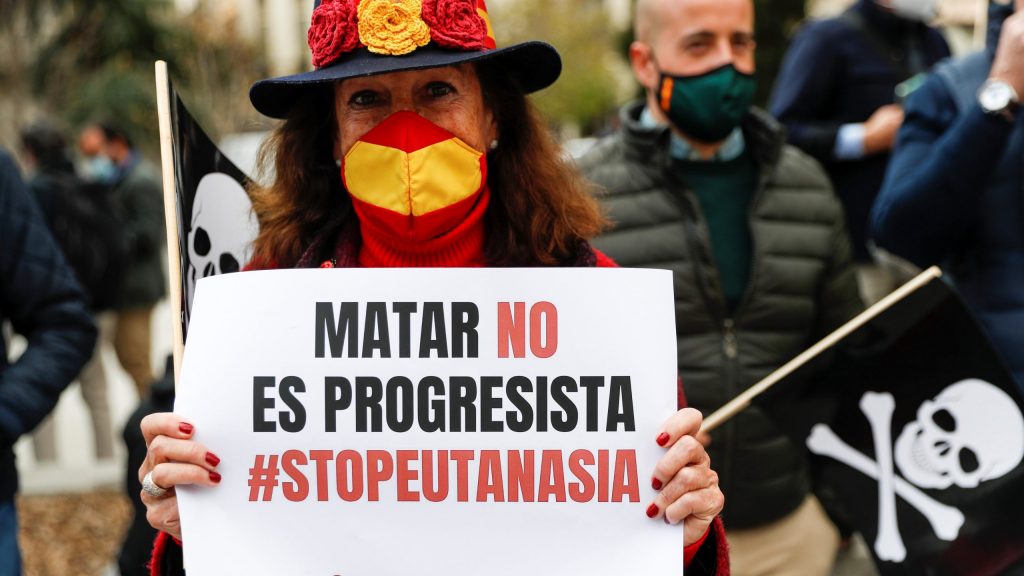Spain's bishops have criticized recent government initiatives on issues from euthanasia to LGBT rights.
In late June, Spain began enforcing a new law regulating euthanasia. The law allows a family member or doctor to sign a euthanasia petition for an incapacitated patient and applies to Spanish citizens medically proven to be facing incurable illness; they must be killed within 40 days of a certified request.
The bishops' conference, which warned in a March statement that euthanasia was "always a form of murder," has urged citizens to sign a living will, protecting themselves against being involuntarily killed.
Cardinal Antonio Cañizares Llovera of Valencia told Spain's La Razón daily July 2 the "iniquitous, criminal, anti-life, anti-human and anti-social" law contradicted the Spanish people's "common good, identity and moral tradition," and warned there would be "no forgiveness or pardon" for politicians backing it unless they "recognize their guilt and the damage caused."
In a July 6 Twitter message, the bishops' conference president, Cardinal Juan José Omella, also condemned the "incomprehensible" measure, which makes traditionally Catholic Spain Europe's fifth country to allow the practice after the Netherlands, Belgium, Luxembourg and Switzerland. He said an "advanced society must provide instruments to eliminate suffering and not to eliminate the person who suffers."
A draft law "for the real and effective equality of trans people and the guarantee of LGBT rights" also was introduced by the government June 29, allowing people over 16 to change their gender in the civil register by a simple court declaration, without medical or legal measures, and imposing heavy fines for all discrimination.
In a June 30 Twitter message, Auxiliary Bishop Luis Argüello Garcia of Valladolid, secretary-general of the bishops' conference, warned the proposed law, which has been protested by feminist groups, would "transform sentiment into a legal category and enthrone the will to power without limit."
Archbishop Francisco Martínez Fernández of Granada accused the measure's promoters of exploiting the coronavirus pandemic, when public debate was restricted, and of showing "an immense lack of respect" for the population.
"Whoever is born a man will always be a man, and whoever is born a woman will always be a woman, no matter which hormones they impose and operations they perform," the archbishop told Catholics in a July 4 homily.
"I'm not asking legislators, who are pagans, to follow Christian criteria when it comes to legislating, or even deep down to respect the human rights which are obvious to us. But if one thing characterizes the abandonment of Christian tradition, it is the collapse of reason, in a society now governed more by group interests and power relations."
The Catholic Church makes up 62% of Spain's 47 million inhabitants, according to 2020 data, and has also criticized government-backed legislation to secularize education and facilitate state-funded abortion, as well as plans by local councils to remove Catholic crosses and monuments from public places.
Bishops voiced mixed reactions to the pardoning of jailed separatist leaders from Catalonia.
On June 22, the Spanish government pardoned nine Catalan politicians, less than four years after they were jailed for organizing a 2017 referendum on the region's independence. Five days earlier, bishops of the Catalonia region called for a "serious and open dialogue" to resolve divisions. They urged "feelings of sincere mercy and forgiveness, while respecting justice."
Archbishop Francisco Cerro Chaves of Toledo told journalists June 24 the pardons, which require assent by King Felipe VI, would normally require "repentance and an intention to make amends."
Cardinal Cañizares warned the move could "open the door to the destruction of Spain's unity."
"Our constitution is not a dogma of faith, but it is a mandatory guideline to be supported and obeyed, which guarantees democracy and the common good," the cardinal told La Razón.
The nine Catalans were convicted of sedition in October 2019 for declaring independence following a referendum, which was declared illegal by Spain's Constitutional Court. The region's former president, Carlos Puigdemont, remains exiled in Belgium.
Justifying the pardon in a TV statement, Prime Minister Pedro Sánchez said his coalition government, which relies on support from Catalan nationalists, sought "a new era of dialogue and reconciliation," adding that the ex-prisoners would remain on probation and barred from public office.

